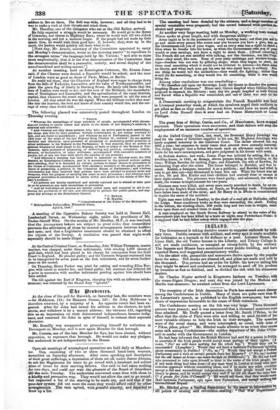gin Vrobinces.
At the close of the poll for Harwich, on Saturday last, the numbers were —for Hobhouse, 131; for Manners Sutton, 127: Sir John Hobhouse is therefore returned, by a majority of 4. An opposite result had been ex- pected. After Sir John had issued his address to the elector; he took alarm, and withdrew it by a second address: the virtuous 131, regarding this as an imputation on their disinterested independence, became indig- nant, and returned Sir John in spite of himself, to redeem their aspersed character.
Mr. Hominy was unopposed on presenting himself for reelection at Devonport on Monday, and is now again Member for that borough.
Mr. Curteis, son of the late Member for Rye, has been elected, without opposition, to represent that borough. He would not make any pledges; but undertook to act independently in the House.
Open-air meetings of unemployed operatives are held daily at Manches- ter. One, consisting of two or three thousand hand-loom weavers, assembled on Saturday afternoon. After some speaking and description of their great sufferings, a deputation of them set off, under James Abrams, to ask the Magistrates for leave to. go round with a handcart and collect alms of bread for their starving fellows. One said he had eaten nothing for two days, and could not wait the pleasure of the Board of Guardians till the next Tuesday. The authorities conversed some time with them in a kindly and persuasive way. They would not allow the cart to go round; but requested a list of the starving to be made out, and said that if the poor-law system did not meet the cases they would afford relief by other arrangements. The men agreed, with grateful alacrity, and departed to draw up a list. The meeting had been dreaded by the citizens, and a large number ITS special constables were prepared; but the crowd behaved with perfect re- straint and propriety.
At another very large meeting, held on Monday, a working man named Nixon spoke at great length, and with dangerous ability— Arms ought to be in the possession of every working man: not that you are to go and shoot every person who comes near you because you have a gun, but as the Government rob you of your wages, and as every man has a right to shoot a felon when he breaks into his house, so when the Government robs you of your wealth or your earnings, you have a right to shoot them. (Great cheering.) The French did not rest satisfied with talking, nor the Germans, nor the Prue- sians—they acted, like men. None of your petty mobbings and window-break_ ings—freedom was not won by pilfering shops.: when they began to steal, let them steal something which it would not be criminal to possess—let them seize on liberty, and when each man got his own let who dared term it robbery. But one thing he would tell the authorities—they would die fighting; either they would die for something, or they would live for something, while it was worth living for.
Among other resolutions was one concluding-
" We therefore call upon our Sovereign Lady the Queen to dissolve the present laughing House of Commons." Nixon said, Gnizot laughed when Odillon-Barrot proposed to impeach his Ministry: next day the people laughed at both Ginza and Barrot when a Republic was established, and one of them was sent on the tramp.
A Democratic meeting to congratulate the French Republic was held in Liverpool yesterday week, at which the speakers urged their auditors to get pikes as fast as they could; for moral force would have no more effect on Lord John Russell than it ever had on Prince Metternich or Louis The great finin of Birley, Corrie, and Co., of Manchester, have stopped payment. Their operations were enormous, and their failure will stop the employment of an immense number of operatives.
At the Oxford County Court, last week, the Reverend Henry Jennings was sued for the value of furniture supplied to his son, Mr. Mapleton Jennings, who lately acquired notoriety in the Insolvent Court. The father allowed his Sea 400L a year; but expenses to many times that amount were annually incurred. The Judge thought that a father who made such an allowance ought not to be liable for his son's extravagances, and gave judgment in his favour with costs.
At Bodmin Assizes, last week, James Pope was indicted for setting fire to a dwelling-house, in 1841, at Breage, divers persons being in the building at the time; William Bawden for inciting Pope; and Elizabeth, the wife of Bowden, for harbouring Pope after the crime. The house belonged to Bawden, and was in- sured. Kistler, a foreigner, tenanted it as a publican; and Bawden had tried in vain to get him out—had threatened to burn him out. When the house was set on fire, Mr. and Mrs. Kistler and their children had scarcely time to escape in their night-clothes. The prisoners were found guilty; and sentenced, the men to death, the woman to imprisonment for two years.
Nineteen men were killed, and seven more nearly scorched to death, by an ex- plosion in the Eagle's Bash colliery, at Neath, on Wednesday week. Complaints have before been made of the mine; and Sir Henry de la Beche is commissioned to inquire the cause of the accident.
Eight men were killed on Tuesday, in the shaft of a coal-pit at Malinslee, called the Lodge. Some machinery broke as they were descending the shaft. Falling to the bottom, the winding-chain, 200 yards long and two tons in weight, came down upon them and crushed them to death.
A man employed on the Smith Devon Railway to attend to the valve of the atmospheric pipe has been killed by a train at night, near Powderhain Point; it is supposed that he had fallen asleep while engaged over the pipe.


























 Previous page
Previous page